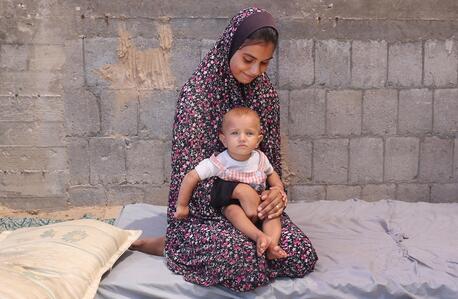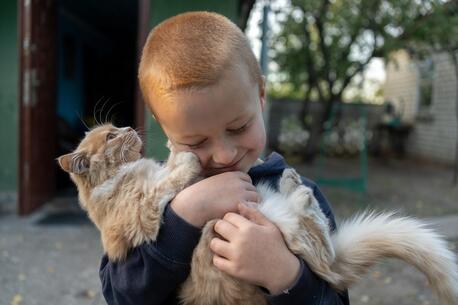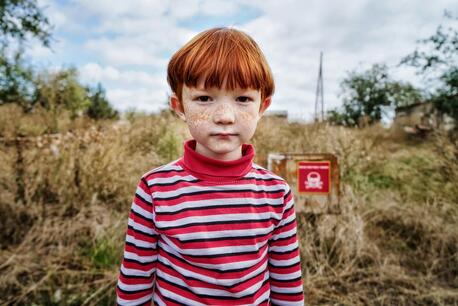
Life in Wartime Ukraine, Through a Child's Eyes
As the war in Ukraine enters its third year, the nation's children are feeling the overwhelming stress of displacement and life under the constant threat of attack. UNICEF and partners are working to protect children's mental health and provide psychosocial support to keep them healthy and preserve their hope for a brighter future.
UNICEF is focused on protecting children's mental health during the protracted crisis in Ukraine
Since Feb. 24, 2022, the escalation of war in Ukraine has had a devastating impact on the country's children. For two long years, children have lived with the fear of bombardment. Classes have moved into basements, playgrounds are littered with landmines and unexploded ordnance. Children sheltering from overhead threats have spent 3,800 to 4,500 hours — up to half a year — underground, undercutting their education and leaving them at significant risk of depression, anxiety and post-traumatic stress disorder.
UNICEF works with partners across Ukraine to protect the physical and emotional health of children growing up surrounded by conflict, including access to education, repairs to water and sanitation infrastructure, warm clothes and a safe place to play.
To improve the well-being of children and young people in Ukraine, UNICEF supports a range of initiatives, from visiting nurses who provide care for small children and their mothers to sports programs and skills-building opportunities for young people.
Every child has the right to a safe and healthy environment. As the conflict continues, Ukraine's children are holding fast to dreams of a more peaceful future. Here are some of their stories.
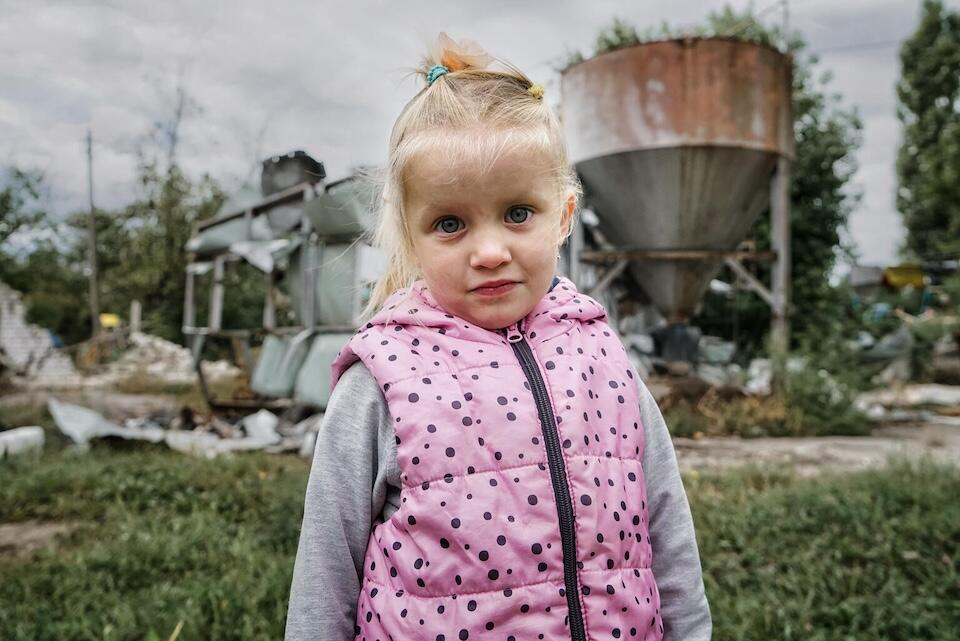
"Where should we go? The nearest shelter is far away. So we stay where we are." — Maryna, mother of 4-year-old Milana
When hostilities began in February 2022, Milana, now 4, was at home with her mother and older sister Arina, now 10, in the village of Mala Rohan, in the Kharkiv region. By Feb. 26, the area was no longer under the control of the Ukrainian government, and the family spent several weeks living in the basement of a high-rise building with 11 neighbors.
There is no school in the village, so Milana and her sister attend classes online. Due to stress, Milana has a speech impairment and is only now starting to talk a little. During air raids, the family shelters in place. When Milana hears explosions, she asks her mother, "Is it thunder?"
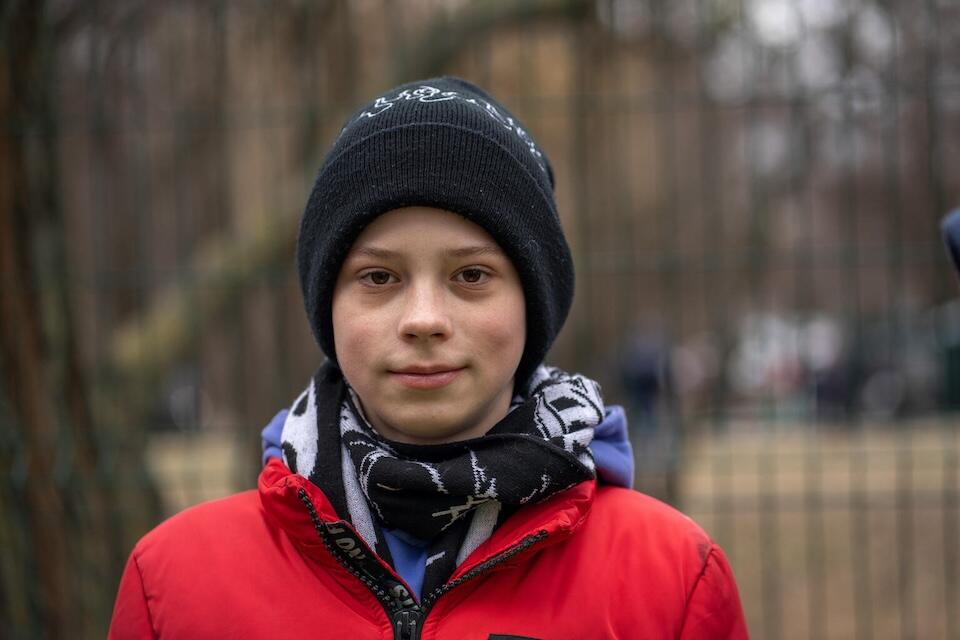
"There were flames and smoke, and my cousin was really scared. We immediately started putting out the flames with water. I was terrified.” — Danylo, 14
After missile and drone strikes on Kyiv in February 2024, Danylo, 14, and his cousin Maria, 10, were trapped in their family's 13th-floor apartment for more than five hours, engulfed in smoke and flames. The children and their aunt were still asleep when the building was hit. Danylo's mother was at work.
Danylo's mother and his friends waited in the courtyard of the building, holding their breath as the fire burned. Rescuers from the State Emergency Service were able to reach the apartment only in the afternoon, after the flames were contained.
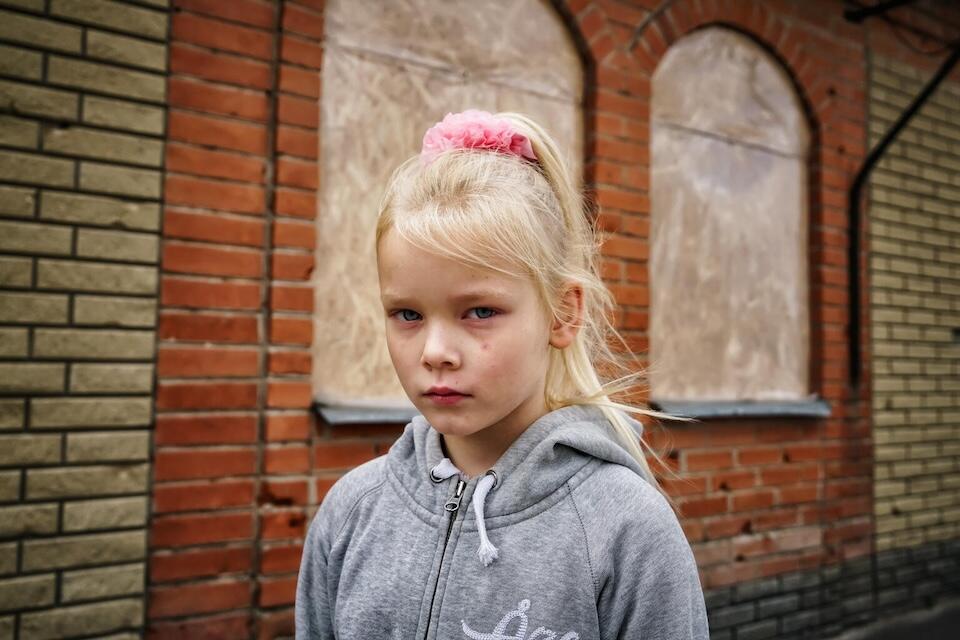
"We live in a kind of bear’s den. We’ve blocked up the windows and live like that.” — Yulia, mother of 8-year-old Karyna
Karyna, 8, remembers the outbreak of the war in her home village of Mala Rohan in the Kharkiv region. Her family spent almost a month sheltering in the cellar, then fled to the home of relatives in a neighboring village. They returned a month later, to a home without windows. They are still missing.
Since the local school was destroyed, all of Karyna's lessons are now online. She loves to study and play with her friends, who she misses most of all. She is very interested in butterflies, snails, dogs and cats.
"What will happen next?” says Yulia. “Let's see.”
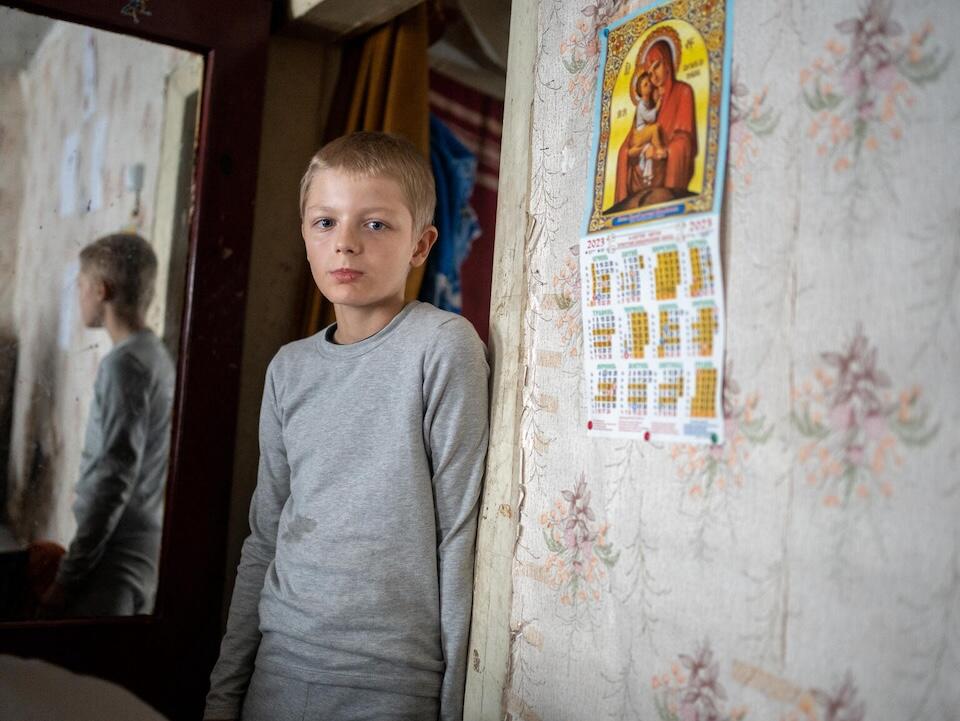
"Before the war, Izyum was whole. Everyone was happy and kind, and now everything is broken, and there's no one left. Many friends have departed." — Bohdan, 11
Eleven-year-old Bohdan lives with his sister and his grandmother in Izyum in Ukraine’s Kharkivska region, a city that has endured near-total destruction during the past two years of conflict.
The local school was shelled in 2022; it's doors are closed now. "The war changed my life a lot,” says Bohdan. “I don't attend school anymore, I avoid places where there could be mines and I don't go far for walks or summer swims in the river."
With education restricted to online classes, Bohdan's only connection to teachers and classmates is via a small phone screen. "Online studying is tough due to potential electricity and internet outages," he says. "Using my phone for studies is challenging. The battery runs out, and I can't hear the teacher well. Besides, my eyes get tired.”
Most of his grandmother's pension is spent on food and firewood to heat their home, with very little leftover to buy warm clothes for Bohdan and his sister. In late 2023, children received sets of winter clothes from UNICEF, aided by support from the USAID Bureau of Humanitarian Assistance (BHA).
"Yesterday it snowed all day. But I'm not in a good mood, because we were shelled all night and I couldn't sleep." — Nika, 11
Eleven-year-old Nika lives with her mother in an apartment building in Kharkiv, northeastern Ukraine. She has been keeping a video diary to stay busy. "This is the second autumn that I haven't gone to school and I've studied online. I'd really like to see my friends, but this is not in my control."
Activities like baking cookies with her mother and going to music class help Nika handle the pressure as she looks forward to a better future, without soldiers and fear. "I believe that bright days will come and we will live in peace," she says.
In 2023, UNICEF reached 8.76 million people affected by the war in Ukraine — including nearly 3 million children — with humanitarian assistance. Over 2.5 million people in Ukraine — and another 1.3 million children and caregivers in countries hosting refugees — received mental health and psychosocial support. More help is needed. Please donate.
Learn more about how UNICEF is working to help Ukraine's children.
HOW TO HELP
There are many ways to make a difference
War, famine, poverty, natural disasters — threats to the world's children keep coming. But UNICEF won't stop working to keep children healthy and safe.
UNICEF works in over 190 countries and territories — more places than any other children's organization. UNICEF has the world's largest humanitarian warehouse and, when disaster strikes, can get supplies almost anywhere within 72 hours. Constantly innovating, always advocating for a better world for children, UNICEF works to ensure that every child can grow up healthy, educated, protected and respected.
Would you like to help give all children the opportunity to reach their full potential? There are many ways to get involved.




